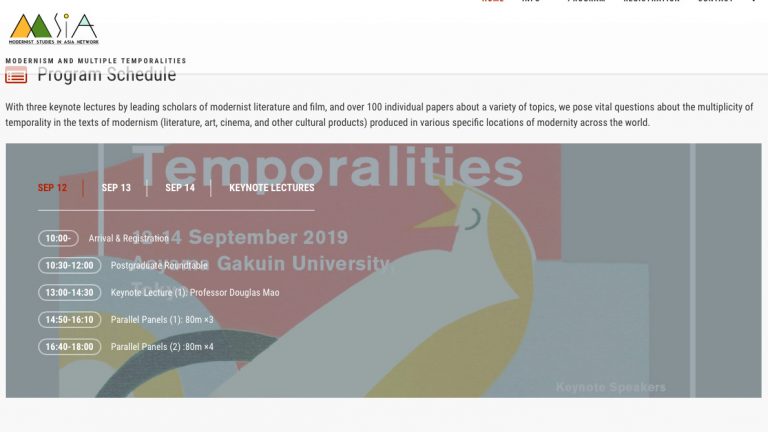2019年9月12日-14日に、青山学院大学青山キャンパスにて開催される国際学会 MSIA (Modernist Studies in Asia Network) の第2回国際大会において、以下の題目で研究発表を行います。
今回は発表者としてはもちろん、総勢100名前後のプレゼンターを世界各国から招き入れる実行委員会の実働部員(およびwebデザイナー兼管理)としての重責もあるので、なかなかに緊張しておりますが、発表内容についてはここ数年断続的ではあれずっと取り組んでいる「時間の流れ方、をどう言語的に表象できるか?」について、わたし自身の主要研究対象である William James、そしてその弟 Henry James、それぞれの時間運動モデルを端的に摘出して論じる予定です。
Kohei Saito
“Succession, Anticipation, Renunciation: Temporalized Consciousnesses in William James and Henry James”
In “The Perception of Time,” chapter XV of The Principles of Psychology (1890), William James examines in detail the question of temporality from a physio/psychological point of view. In order to accord with his own theory of “stream of consciousness” that the mind is constantly in the states of successive changes, William James basically presumes time as continuous succession, sensible process. While struggling to hold a holistic view that consciousness, as well as the continuity of time, is “the wholes already formed” (a phenomenon that is indivisible to substantial parts or elements), William James cannot but hypothesize “the specious present,” a range of “short duration” on which consciousness can transitorily depend to be aware of its own changes and movements. Insofar as the Jamesian psychology assumes consciousness as a horizontal succession, the present needs to be highlighted as the coming moments to which perception or sensation corresponds one after the other and consciousness pertains.
As dedicated an explorer of human consciousness as his brother, Henry James, with his elaborate technique of narration and tense manipulation, provides more complicated, multi-layered dynamics between consciousness and temporality. The narrating consciousness in his works, for example John Marcher in “The Beast in the Jungle” (1903) and Lambert Strether in The Ambassadors (1903), supplement the mere succession of the present with the nuanced dimensions of mental functions: anticipation, retrospection, and, most strikingly, past anticipation that has never come true. What this psychological and temporal configuration of internal narration evokes has to do with the theme of “renunciation” that Henry James attempted to explicate in his last years. Comparing how consciousness is psychologized and temporalized by both William James and Henry James, I would like to shed light on a slight but critical difference between the two Jamesian discourses on human mind.

